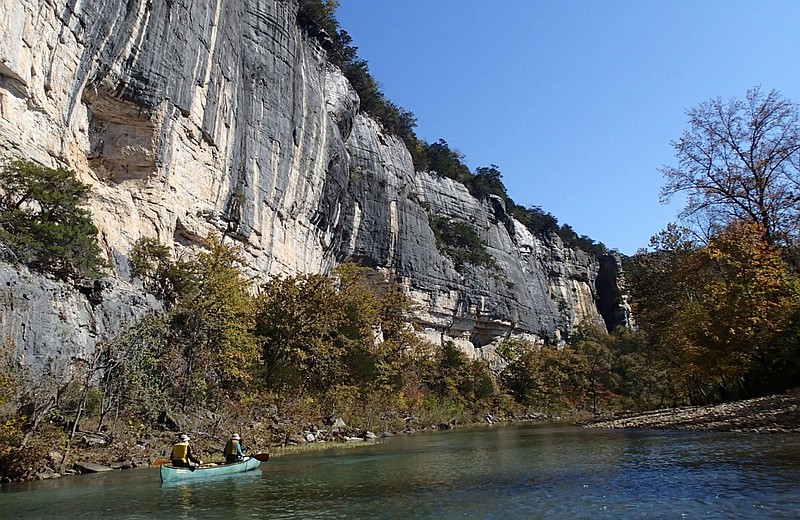HARRISON -- A Bentonville man was found guilty Tuesday of two misdemeanor counts stemming from a May 7 hike in which a Springfield, Mo., man fell to his death in a rugged section of the Buffalo National River park.
After a bench trial in federal court in Harrison, Magistrate Judge Mark E. Ford determined that Jeffrey Johnson led the hike and had solicited money for his services.
Johnson didn't testify in the trial. Based on other testimony, he led a group of 31 hikers along Indian Creek Trail heading to a rock formation known as Eye of the Needle. Indian Creek Trail isn't an official park trail, according to court testimony.
In a telephone interview with investigators, the audio of which was played in court, Johnson said he advertised the hike on Facebook and too many people showed up wanting to go. Johnson said he normally limits the number to about 15, but Facebook didn't give him the option to limit the size as a website he previously used allowed him to do.
Johnson became emotional and wept during the telephone interview when he spoke of the hiker who died.
"I wish he had listened to me about how important it was [to stick together] and how dangerous it was," Johnson could be heard saying on the recording.
Brad Lee Thomas, 46, and at least one other hiker decided to turn back during the hike, unbeknownst to Johnson, and Thomas fell to his death.
Veronica Gilmore of the Springfield, Mo., area, testified that she and Thomas decided to turn back because the next section of the hike seemed dangerous. She said she told a man named Joel who was participating in the hike.
Gilmore said they were advised to go back to the spot where the group had lunch, so they did, but after three hours, the group hadn't returned.
Gilmore testified that she was wet because she had fallen, and it was getting dark, so Thomas said, "I think we should go ahead and go because we've waited almost three hours and nobody has shown up."
It wasn't clear from Gilmore's testimony exactly when Thomas fell or if she had witnessed the accident.
Daniel Romes, a park ranger who worked at the Buffalo National River in May, described the Indian Creek Trail hike as very difficult, with narrow trails along a bluff and a rope climb along the way.
"You shimmy along a shelf and you squeeze through a hole to get there," he testified.
At one point along the hike, there's a 50-foot drop, he said.
Romes said a woman suffered a leg injury on May 1 while hiking with another group led by Johnson in the same area.
"I told him to please stop hiking in that area," testified Romes.
When he learned that another hike along Indian Creek was planned for May 7, Romes said he went to the area where hikers were to meet, but didn't find them.
"I went there to stop the hike from happening," he said.
Late that afternoon, Romes learned that a hiker was injured along the Indian Creek Trail.
He went there and saw first responders working on Thomas.
"He had fallen from a rock ledge approximately 15 or 20 feet high into a pool [of water along Indian Creek]," said Romes.
He said 47 people assisted with the search and rescue effort.
Romes testified that the park began issuing permits for large group hikes after the May incident. Before that, Johnson's hike wouldn't have been permitted, he said.
Chris Flanagin, Johnson's attorney, argued that his client took no payment for leading hikes in the national park, so he wasn't operating a business there.
But Devon Still, representing the government, produced documents from the internet indicating Johnson sought a $20 annual fee for membership in his hiking group: Arkansas Nature Lovers Group. Some people paid Johnson in the national park, according to court testimony.
Ford found Johnson guilty of violating two sections of the Code of Federal Regulations: 36 CFR 5.3, engaging in or soliciting business in park areas without a permit; and 36 CFR 2.37, illegally soliciting money, goods or services.
Ford found Johnson innocent of 36 CFR 1.6(g)(1), engaging in an activity subject to a permit requirement without obtaining a permit. Ford said he agreed with Flanagin that that charge was "piling on."
Johnson's sentencing is scheduled for March.
